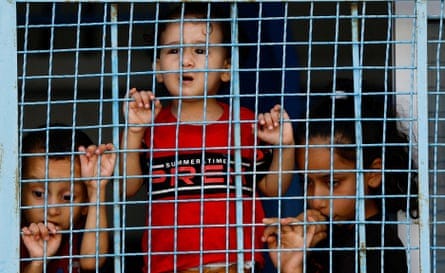On Certain Asymmetries
A few thoughts on how we talk about the Israel-Hamas war

Many commentators have argued that Israel lacks a strategy for dealing with Gaza and is just lashing out. That is reasonable enough. But why do so few ask what Hamas want - what their endgame is? Perhaps because the true answer is too horrifying to confront.
As Yair Rosenberg reminds us, with plenty of evidence, Hamas (like its backer Iran) does not seek national liberation for Palestinians so much as Jewish elimination. The genocidal destruction of Israel is written into Hamas’s charter: “Our struggle against the Jews is very great and very serious … The Day of Judgement will not come about until Moslems fight the Jews (killing the Jews), when the Jew will hide behind stones and trees. The stones and trees will say O Moslems, O Abdulla, there is a Jew behind me, come and kill him.” For anyone who was under the impression this is just rhetoric, October 7th provided terrifying evidence to the contrary. Hamas and its supporters want the Jews gone, “from the river to the sea”, by any means necessary, though preferably violent ones. (I strongly doubt this is true of most Palestinians, by the way).
If nothing else, the October attacks reminded the world why Israel takes such an aggressive, militarised posture towards its borders. That isn’t to excuse its myriad moral offences over the years. But let’s be clear about what and who they’re up against. Hamas and its allies are not interested in a peaceful settlement with the state of Israel. The only reason Hamas would agree to a ceasefire is to start planning for a new attack. Given that, what should Israel do in response to this one? You should not find this easy to answer.
The Israel-Hamas conflict is asymmetric in more ways than one. We are familiar with the asymmetric military and economic advantages that the Israelis have over the Palestinians, which is why the former are often - and sometimes with justification - portrayed as bullies. We tend to overlook the asymmetry of objectives. While the Israelis have shown themselves capable of treating the Palestinians appallingly, they are not seeking to annihilate them. The most fervent wish of Israel is to secure its borders and protect its people. If the Israelis let their guard down, however, they face being destroyed, by Hamas and its allies, to the last man, woman, and child.
There is also asymmetry in the protests on British soil. Israeli sympathisers have managed to protest peacefully without calling for anyone to be killed or chanting racist slogans - how about that. There has been a sudden and terrifyingly steep rise in anti-Semitic attacks in London, accompanied by a much smaller rise - thank goodness - in Islamophobic ones. Meanwhile, the Western left continues to act as if Israel is the only guilty party in the conflict. It’s as if they can’t process the horrors of October 7th - perpetrated by representatives of their ‘side’ - and so have simply pretended they didn’t happen.
Steve Coogan and Tilda Swinton were among two thousand artists who signed a letter condemning Israel’s actions in Gaza as war crimes, without specifying any (though the letter is right to condemn the use of the phrase “human animals” by an Israeli minister). Amazingly, and unforgivably, they somehow contrive not to even mention the October 7th atrocities, or indeed the actual and ongoing war crime of hostage-taking: over 200 Israelis are currently being held as human currency. I suppose the signatories just cannot compute anything horrific happening in the Middle East, and Israel not being to blame.
Similarly, over six hundred writers have signed a letter in the LRB which refers to the attacks only indirectly, in bland “both sides”pablum (many of those who in 2020 pointed to the inadequacy of “all lives matter” have retreated behind similar formulae). After that dutiful paragraph comes the letter’s most shameful sentence: “Nothing can retrieve what has already been lost.”
In other words, “The savage massacre of 1400 Israeli civilians has already happened, what are you gonna do?” Well, you could mention it directly. You might even tell us how you feel about it. It happened less than two weeks ago. Isn’t that a little soon to “move on”? October 7th surely deserves more than this shrug over spilt milk; this sheepish little pivot towards the real business of the letter. (The next word is “But” and everything after it is about Israel’s supposedly “genocidal” crimes.)
Nothing can retrieve what has already been lost. Imagine showing those hostages that sentence. By turning their face from October 7th the letter-writers have unwittingly aligned themselves with those who are currently scuttling around the streets of London - this is not the only example - tearing down posters of missing Israeli children. If we don’t talk about it, if we don’t confront it, it never happened: nobody was murdered, nobody was raped. (Striking, also, that a letter from people usually quick to rise to the defence of oppressed minorities should devote not a word to the predicament of British Jews, who have spent the last couple of weeks living in fear, afraid to send their children to school).
As Ed West says, it’s perfectly possible to support the Palestinian cause while expressing, not just polite disapproval, but disgust with the evils committed by Hamas (Ed cites the historian William Dalrymple doing just that). In fact, as Jonathan Freedland eloquently argues, the two sentiments should go together, since Hamas is a curse on the Palestinian cause. It is Hamas who are partly responsible for the terrible scenes now unfolding in Gaza; for the thousands of Palestinian lives already lost in Israeli airstrikes.
A direct and heartfelt denunciation of the Hamas massacre is a prerequisite of credible criticism of Israel’s actions. It’s actually surprising how rare this position has been on the left, since it is both morally coherent and the most effective strategy in the court of public opinion. Everyone has seen the pictures and heard the harrowing stories from October 7th. Everyone apart from those letter-writers, seemingly. (This is before we get to those leftists who actually celebrated the attacks. I won’t say more about them except that it makes you wonder what can’t be justified in the name of decolonisation.)
There is asymmetry, too, in the reliability of information from the parties in this conflict. In the aftermath of the disastrous misreporting of the Gaza hospital explosion, I’ve seen people say we should be sceptical of all official sources. Well, yes and no. I agree that scepticism about what all the participants say is necessary, but there are degrees of credibility. I do not think that Hamas is just as reliable a source as Israel or the U.S.. The BBC and Sky had it the other way around: they simply swallowed what Hamas told them about the blast, and reflexively disbelieved the Israelis (even though their prior should have been that the Israelis were highly unlikely to have blown up a hospital on the eve of a visit from the American president).
I don’t know how Israel should respond to the attacks and won’t pretend to. I just know that it’s not good enough to call for an end to the killing and destruction without specifically and unequivocally condemning Hamas’s actions and aims. Neither side is innocent; both sides are not the same.

A Few More Links on Israel/Gaza
Amidst the shitstorm there are plenty of journalists who are more interested in the facts than in seeing their side prevail, pleasing an audience, or winning clicks. You’ll have your own trusted sources, mine include the calm and judicious Shashank Joshi of the Economist.
I fear that academically trained historians who strive for an objective view of current affairs are in increasingly short supply, so let’s make the most of Lawrence Freedman. Same goes for Helen Thompson. I learnt a lot from her and Tom McTague’s podcast episode for Unherd on the history of the conflict (although I think they need to up the energy levels, I do find myself drifting away). And do read Tom’s masterful, rich article on the conflict, which gives an even longer historical view.
Interesting thread from the FT’s John Burn-Murdoch on why large parts of the mainstream media got the hospital blast story so wrong.
Powerfully written piece on the Israeli perspective on the conflict. Note that, as the author himself says, you don’t have to agree with his version of the history to grasp his central point, which is about how Israelis on left and right now feel about the matter, and what that implies.
One of the few positive stories to emerge has been Biden rising to the moment. The collapse of the Afghan army in 2021 seemed to catch him by surprise, and his reputation never really recovered. But he has responded to this shock with a much surer touch, showing clarity of mind, anger, and empathy. American diplomacy in the coming weeks will be vital to avert the worst. Biden’s strong response has won the trust of Israelis, which gives him more clout with Israel’s leadership. It also lets Iran know that any escalation is risky for them.
Rattle Bag

Giving thanks for the privilege of living in a peaceful country, here are ten delightful things that have nothing to do with the aforementioned events, including a truly mindblowing version of Kate Bush’s Running Up That Hill.
Brian Cox (Logan Roy) gives a masterclass in Shakespeare to a two-year-old boy. Honestly, just watch it. I heard Cox talk fondly of this clip in a radio interview recently, and he noted how little Theo starts to use his arms for dramatic effect: “How did he know to do that? I didn’t teach him that!”



